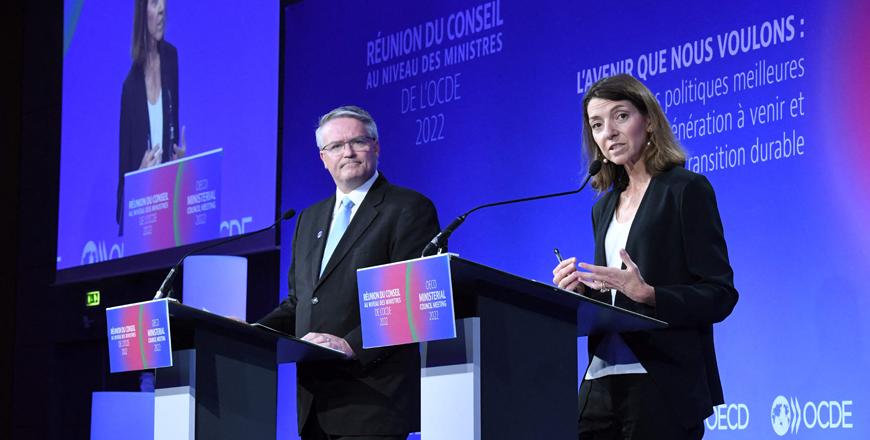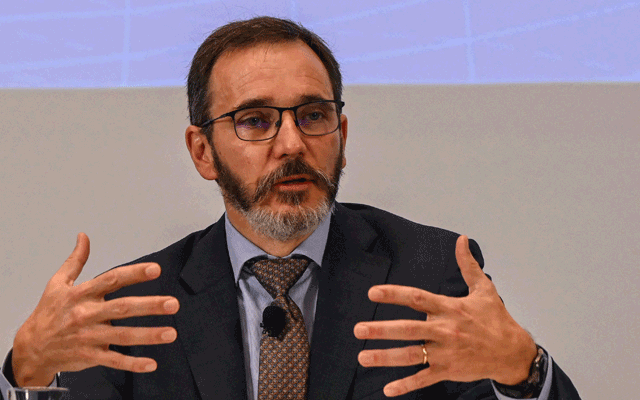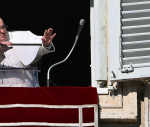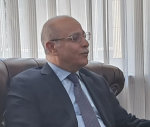You are here
OECD sees lower world growth
By AFP - Jun 08,2022 - Last updated at Jun 08,2022

OECD Chief Economist Laurence Boone talks as Secretary General Mathias Cormann listens during the presentation of the OECD Economic outlook at the OECD headquarters in Paris on Wednesday (AFP photo)
PARIS — The Organisation for Economic Cooperation and Development (OECD) warned on Wednesday that the world economy will pay a "hefty price" for Russia's invasion of Ukraine.
The OECD’s statement came as it slashed its 2022 growth forecast and projected higher inflation.
The Paris-based organisation, which represents 38 mostly developed countries, is the latest institution to predict lower gross domestic product (GDP) growth due to the conflict, which has sent food and energy prices soaring.
In its latest economic outlook, the Organisation for Economic Co-operation and Development said global gross domestic product would grow by 3 per cent in 2022 — down sharply from the 4.5 per cent estimated in December.
The OECD also doubled its forecast for inflation among its members — which range from the United States to Australia, Japan, and Latin American and European nations — to 8.5 per cent, its highest level since 1988.
"The world is set to pay a hefty price for Russia's war against Ukraine," wrote the OECD's chief economist and deputy secretary general, Laurence Boone, adding that a "humanitarian crisis is unfolding before our eyes".
"The extent to which growth will be lower and inflation higher will depend on how the war evolves, but it is clear the poorest will be hit hardest," Boone said.
"The price of this war is high and will need to be shared."
Before the war broke out, the outlook had appeared "broadly favourable" for 2022-23, with growth and inflation expected to return to normal after the devastating COVID-19 pandemic, said the OECD.
However, "the invasion of Ukraine, along with shutdowns in major cities and ports in China due to the zero-COVID policy, has generated a new set of adverse shocks," it said.
Food shortage risk
The OECD was supposed to publish its outlook in March, but it delayed its detailed assessment until now due to uncertainty over the war. At the time, it said the conflict could cut global GDP growth by "over one percentage point".
The World Bank revised its own figures on Tuesday, lowering its global growth forecast from 4.1 per cent to 2.9 per cent. The IMF cut its forecast by nearly one point to 3.6 per cent in April.
The OECD cut its growth forecast for the United States from 3.7 per cent to 2.5 per cent and that of China, the world's second biggest economy, from 5.1 per cent to 4.4 per cent. The eurozone's GPD is now seen growing by 2.6 per cent instead of 4.3 per cent while Britain's outlook was lowered to 3.6 per cent from 4.7 per cent.
The OECD noted that commodity prices had risen, hitting real income and spending, "particularly for the most vulnerable households".
"In many emerging-market economies the risks of food shortages are high given the reliance on agricultural exports from Russia and Ukraine," it said.
The report warned that the "effects of the war in Ukraine may be even greater than assumed", raising as an example a scenario of Russia cutting gas supplies to Europe.
As central banks tighten their monetary policies to counter inflation, the report said sharp increases of interest rates could also hit growth more than anticipated.
COVID risk
The COVID pandemic, meanwhile, could take another turn for the worse.
"New more aggressive or contagious variants may emerge, while the application of zero-COVID policies in large economies like China has the potential to sap global demand and disrupt supply for some time to come," the OECD said.
Faced with these challenges, governments needed to protect the most vulnerable from the economic shockwaves, it added.
In the short term, "temporary, timely and well-targeted" fiscal measures would help the poorest households, the OECD said.
Over the medium- and long-term, governments would have to invest more in clean energy and defence spending.
"The world is already paying the price for Russia's aggression," wrote Boone.
"The choices made by policymakers and citizens will be crucial to determining how that price will be distributed across people and countries."
Related Articles
PARIS — The Organisation for Economic Co-operation and Development (OECD) warned on Wednesday that the Omicron coronavirus variant threatens
The Organisation for Economic Cooperation and Development (OECD) called Thursday on the world's leading countries to step up measures to support flagging global growth, in particular urging the European Central Bank (ECB) to overcome its reluctance and undertake quantitative easing.
WASHINGTON — Global growth is set to be higher than expected this year, the IMF said on Monday, raising its forecast on surprisingly strong

















